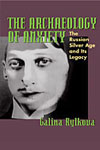
Professor of Russian
Ph.D., University of Toronto, Canada
- 256 Dauer
- grylkova@ufl.edu
- 352.273.3792
- Curriculum Vitae (pdf)
Office Hours — Spring 2022
- By appointment
Courses offered in Spring 2022
- RUS4411 Russian Advanced Oral Practice
Areas of Interest
Psychology of Creative Personality; Russian and European Modernism; Anton Chekhov; contemporary Russian literature; cultural studies; and Russian cinema.
Biography
Galina Rylkova is a Professor of Russian/Slavic Studies. She was born in Moscow, Russia, and received her M.A. in Romance-Germanic languages and literatures from Moscow State University. She then moved to Canada where she received her Ph. D. from the University of Toronto in Slavic Languages and Literatures. Her teaching and research have been focused on Russian and European Modernism; Anton Chekhov; Memory and Cultural Studies. She has published articles on a wide range of topics, including cultural memory about the Russian Silver Age, and the writings of Chekhov, Tolstoy, Dostoevsky, Nabokov, Pil’niak, and Pasternak. She is the author of The Archaeology of Anxiety: The Russian Silver Age and Its Legacy, published by the University of Pittsburgh Press. The Archaeology of Anxiety describes how Russian writers (Akhmatova, Nabokov, Pasternak and Viktor Erofeev), Russian intellectuals and the public at large were coping with the existential anxieties unleashed by the Bolshevik Revolution, Stalinist Terror, Khrushchev’s Thaw and Gorbachev’s perestroika in 20th-century Russia.
Rylkova’s second book, Breaking Free from Death: The Art of Being a Successful Russian Writer, examines how Russian writers respond to the burden of living with anxieties about their creative outputs, and, ultimately, about their own inevitable finitude. What contributes to creative death are not just crippling diseases that make man defenseless in the face of death, and not just the arguably universal fear of death but, equally important, the innumerable impositions on the part of various outsiders. Many conflicts in the lives of Rylkova’s subjects arose not from their opposition to the existing political regimes but from their interactions with like-minded and supporting intellectuals, friends, and relatives. The book describes the lives and choices that concrete individuals and—by extrapolation—their literary characters must face in order to preserve their singularity and integrity while attempting to achieve fame, greatness, and success.
Publications
